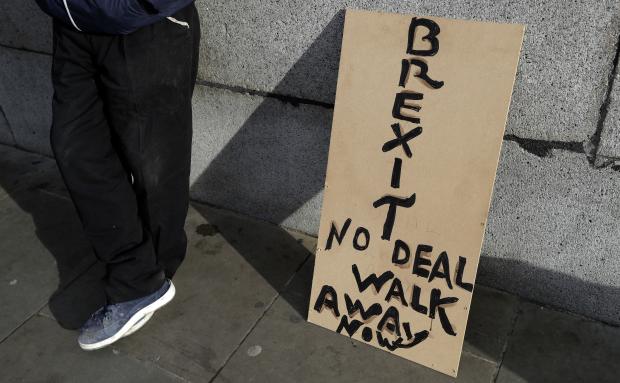
A banner leans on a wall near to parliament in London, Friday, Jan. 18, 2019. Talks to end Britain’s Brexit stalemate appeared deadlocked Friday, with neither Prime Minister Theresa May nor the main opposition leader shifting from their entrenched positions. (Photo by KIRSTY WIGGLESWORTH / AP)
LONDON — Britain’s Labour Party is calling for an “open and frank debate” on the government’s stalled Brexit plan and an increased role for Parliament — but still won’t meet with Prime Minister Theresa May for talks.
The main opposition party’s Brexit spokesman Keir Starmer plans to use a speech Saturday to say it is now up to Parliament to take the tough decisions needed to break the impasse.
May’s withdrawal plan from the European Union was soundly rejected in Parliament this week, leading to crisis talks before her return to Parliament Monday with amended plans.
As things stand now, Britain is scheduled to leave the EU bloc on March 29 without an agreed upon withdrawal plan. Many economists and national leaders warn this “no-deal” scenario could have serious economic consequences.
Labour Party leader Jeremy Corbyn refuses to take part in the talks May has requested until the prime minister removes the possibility of a “no-deal” departure from the table. She says there is no legal way for her to do so.
Corbyn said in a Friday night letter to May that the talks are just a delaying tactic and complained that she is unwilling to consider extending the deadline for Britain’s withdrawal or allowing a second referendum on the Brexit question.
“Whatever one thinks of those issues, that reinforces the view these are not genuine talks, but designed to play for time and give the appearance of reaching out, while sticking rigidly to your own emphatically rejected deal,” he said.
Former Conservative Prime Minister John Major told the BBC Saturday that a “no-deal” departure would be the worst possible outcome that would harm millions of people..
He said Parliament should be allowed to hold a series of “indicative” votes on a number of different Brexit plans, and lawmakers should ideally be given a free vote without being constrained by party loyalties.
This could provide a way out of the morass, he said, adding that a second referendum may be necessary now that more facts are known about the complexity of Brexit. /atm